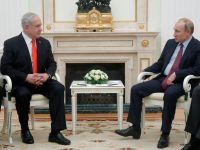By Munir K. Nasser
Chief Correspondent, Washington, DC
Albawaba.com
A New York Times editor said the Israeli and Palestinian sides always complain that the newspaper is focusing on one side or the other as the greater victim. He said both sides are demanding that the paper becomes “the scorekeeper” of their victims.
Deputy Foreign Editor of the New York Times, Serge Schmemann, said in an interview that his newspaper tries to focus on fairness in its coverage of the violence. He argued that sometimes correspondents in Israel went to funerals but have not written about them because they felt “that it is very powerful, emotional funeral, but it is one-sided.”
Schmemann said functioning in the Arab world is not always as easy because it requires huge battles to get visas to enter the country. He expressed interest in interviewing President Arafat, but complained that Arafat “doesn’t seem to feel that there is a purpose in talking to the New York Times or that there is anything to say.”
Schmemann has worked as Middle East correspondent for the New Times for many years. As Deputy Foreign editor, he oversees 32 full time correspondents and 26 bureaus around the world. The total daily circulation of the New York Times is about 1.2 million copies and 1.8 million copies on Sundays. The following are excerpts from the interview conducted at the New York Times headquarters in New York City:
Q- What are the most common complaints about the New York Times coverage of the Middle East?
A- In the Middle East, the most frequent complaint is that we are focusing on one side or the other as the greater victim. The Israelis always complain about some words we use, such as [certain number] of Palestinians were “killed” today. They say that’s not fair because it is actually a war and they point out that we didn’t “kill” them, so both sides were in danger and this was a military action.
The Palestinian side also complains that we don’t focus on the huge numbers of deaths. What we find both sides are demanding of us is for us to become the scorekeepers of their relative victims. Who is suffering more? Who is paying the greater price? Who is the greater victim? Quite frankly, that’s not our job. Our job is to say what is the main event of the day and try to describe what happened and why. Which is increasingly mysterious to all of us why it is going on for so long. But we really cannot be and we don’t want to be in a position of keeping score. This is where most letters and complaints are coming from. That we haven’t recognized the great sacrifices of this side or that side.
Q- What is the nature of complaints from the Arab side?
A- There are charges from the Arab side that our coverage is biased, that we are totally pro-Israeli and that we view everything from an Israeli prism. From the Israeli side we get close to 300-400 critical e-mails. We get a lot of complaints from all sides, but probably far more from Israeli and Jewish readers. There are organizations like CAMERA, which exists to monitor every word we write, and the Israeli Consulate, which sends us a large number of complaints and comments.
Q- How do you handle such complaints?
A- Our coverage of the Middle East is scrutinized very carefully by Jewish groups, but also very much by Arab and Islamic organizations. Our policy is to answer all serious letters. We have a person who is in charge of answering complaints and answer them himself. Before, complaints were sent to “letter to the editor,” but now we have a person in the newsroom. We don’t answer crank letters and we don’t answer campaign letters that say the same thing.
Q- To what extent you make sure that both sides are covered?
A- We talk and think about this all the time. The word is not objectivity, but fairness. We try to create as fair an image as possible. Sometimes it even constrains us. Debbie [Deborah] Sontag, our correspondent [in Israel], has gone to funerals, and has not written about those funerals because she has felt that they are very powerful, emotional funerals, but they are one-sided. Actually, she sometimes passes up some good stories because her feeling and our feeling is that this would create a sense of imbalance, that it will not be fair. There are stories where she got a lot of criticism for something we talk about endlessly when the Israeli school bus was hit and some children lost their arms. She indirectly hinted that the Israelis were doing with their children was similar to what the Palestinian were doing with their children, throwing them to the front lines in a different way. You should have seen the reaction to the story from the Israeli side. In all these cases, there is an enormous and constant discussion about fairness.
Q- From the Arab point of view, your coverage of the current Intifada was more sympathetic to the Israelis by reporting their funerals and pain of family members, while reporting Palestinian pain in just numbers? How do you respond to that?
A- This is not true. We covered many funerals on the Palestinian side, and we spoke to families, and we covered losses. We have been to hospitals many times, and we watched people die in the hospitals, and described that. I don’t think that criticism is valid if you look at our coverage.
Q- Are you hearing any criticism from the Palestinian Authority?
A- We wish we would hear more from them. We have good access to them and can talk to anybody at different levels. But we don’t get the sense that they read the New York Times. We wish they would, because we would love to interview Arafat. We never interviewed Arafat. He doesn’t seem to feel that there is a purpose in talking to the New York Times. He already talked to Clinton, so why bother. It is one of the problems we wish that we could have more clout with him and his entourage. Younger Palestinians are far more savvy about using the media.
Q- Do you reject a story if you feel it is one-sided?
A- There is a point beyond which you can’t reject a story. A story you have to tell. Something has happened. It is one-sided story because it happened on one side. You tell it. But we have a lot of discussions. I am on the phone daily with Debbie; we look at the story very carefully. We try to be fair, something that honestly consumes a great deal of our time.
Q- How do you cover the Arab world, and how many correspondents do you have for the region?
A- We have full time salaried stringers in both Gaza and the West Bank. Both of them speak Arabic and are serious journalists. We have a correspondent in Cairo, and we have an Islam correspondent who is permanently on the road. His name is John Burns, he's is in Yemen now. He was in Lebanon and is going to Iraq next. We very often send reporters from here. We have John Kifner who went from New York and spent many weeks in Lebanon covering the elections.
Q- Would you send a Jewish correspondent to cover Palestinian areas?
A- Sure. And we have American Jews as correspondents in Israel. There was a policy not to do that, but it has long been abandoned.
Q- Would they be as objective?
A- Yes they will, because if they are not, they will be pulled out immediately. The problem, quite frankly, an American Jew in Israel is expected by the Israelis to take sides. And he gets a lot of pressure from the Israelis, who expect that every American Jew to join them. So there is a pressure, but it is not a pressure of fairness on the Arab Israeli side, but an internal pressure which can be quite strong and quite painful. We are not going to send kids to that part of the world. You don’t send amateurs who may be easily manipulated or influenced or who have any known prejudice or position of their own. We really send our best professional journalists to the region.
Q- The number of your correspondents in the Arab world is disproportionate to what you have in Israel?
A- Yes. If you look at in terms of per capita, probably this seems disproportionate. Objectivity is not necessarily measured numerically how many per capita. But Israel is traditionally a country of enormous interest here because of the large Jewish population in New York, and it is a country where the United States spends huge amounts of money in which there is a huge amount of interest. That’s why we always had a correspondent stationed there.
Q- What are the difficulties faced by your correspondents in the Arab countries?
A- Functioning in the Arab world is not always easy. It requires huge battles to get visas to enter the country. In Cairo we have a permanent bureau, and we are actually thinking of transferring that to Beirut. This doesn’t sound like what you would like to hear, but it is a reality of how we cover the world. Some countries are very difficult to enter, like Saudi Arabia, Iraq, Syria and Iran. Our correspondent right now is in Saudi Arabia. She wrote a very nice story about Saudi women shopping in the malls.
Q- Do you depend on the Israel press and the Arab press as sources of information?
A- Yes. The Israeli press is a totally free and unhampered press.
Q- How about military censorship?
A- On military issues, yes. But on social and political issues, it is free as we can see [in the coverage of the current crisis]. In the Arab world, we find much of the press considerably more controlled. May be they are not as diverse, but certainly in countries like Egypt, we read major newspapers carefully, like Al-Ahram, and get to know the journalists and talk to them. Our correspondents read the major Arabic papers and our correspondents in Israel read major Hebrew papers.
© 2000 Al Bawaba (www.albawaba.com)







